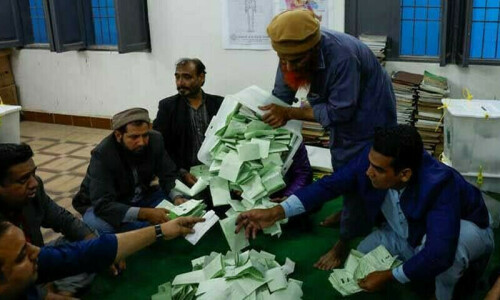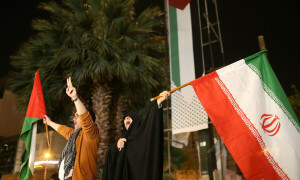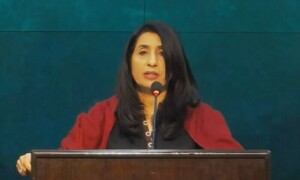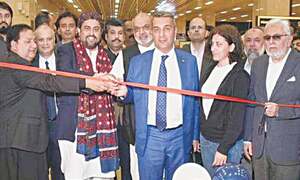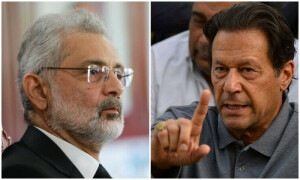
If your husband raises his hand on you, and you are a constant victim of physical violence, humiliation and verbal abuse, a time may come when you say “enough is enough”.
Whether it is an urban, educated women or a woman from an under-privileged rural background, social pressures and conditioning can keep her tongue-tied and stop her from complaining to anyone about the abuse. But one fine day, if the beats her and her children black and blue, and she decides that it is time to stand up for her right, what is she going to do? Does she know what to do? Whom to complain to? And as this is regarded as “a family matter”, will the law side by her?
These were some of the questions answered at the recent “Provincial Dialogue on ‘Domestic Violence Bill’ - Policy and Data Monitoring Violence Against Women (PDM-VAW)”, organised by the National Commission on the Status of Women (NCSW) and Aurat Foundation (AF) on October 13, 2011 in Karachi.
“The Domestic Violence Bill had been passed by the National Assembly in 2009. However, once it reached the Senate, it lapsed. After the passage of the 18th Amendment, the bill comes under the Provincial governments’ domain,” explains Maliha Zia, a lawyer who has expertise on Gender & Law.
The aim of the event was to reinitiate the legislative process on the said Bill. MPA Humaira Alwani, who was also present at the occasion, had submitted the Bill as a private member’s bill in 2008. But the desired effect did not take place. “Events such as this provincial dialogue are an attempt to make the government take ownership and responsibility of this issue, as domestic violence has reached epidemic proportions in our society.
But the main problem is that it is considered a private matter and women are encouraged not to come into the public sphere with their complaints,” says Zia.
Also present at the occasion were Ms. Anis Haroon, Chairperson NCSW, Nisar Ahmed Khuhro, current speaker, the Provincial Assembly of Sindh, Tauqeer Fatima Bhutto, Provincial Minister for Women’s Development, Sindh, Ms. Sharmila Farooqi, lawyers, human rights activists and journalists.
The definition of Domestic Violence (DV) in the proposed Bill is that “Domestic Violence includes but is not limited to all acts of gender based and other physical or psychological abuse committed by an accused against women, children or other vulnerable persons, with whom the accused is or has been in a domestic relationship.”
Thus, the person committing DV may not necessarily be the husband. It can be a brother-in-law, a step-son or even a brother. And the victims can and do include children.
As Zia explained in her detailed and insightful presentation, DV includes much more than just physical beating. It includes assault, use of criminal force and intimidation, wrongful confinement, inflicting hurt, trespassing and harassment. Physical abuse is of course the most salient part. But an interesting new addition is the term “stalking” as part of DV which could mean watching, loitering around or following the victim.
Sexual abuse is an important part of this. This also includes “forcing the wife to cohabit with anybody other than the husband”. This does not include only rape, and is an umbrella term for many other violations. Sexual abuse of children by a relative, which amounts to incest, is a serious and damaging kind of abuse, the effects of which the child will carry with him/her throughout life in the form of psychological scars.
Economic abuse is also included, which can entail forcefully snatching away the woman’s earning. Willful or negligent abandonment of the aggrieved person is another form of abuse.
What really touched a raw nerve with the participants was Section 4 (m), which included, very aptly, “emotional, psychological and verbal abuse”. How commonly we see the things mentioned in this section around us. Degrading and derogatory remarks, use of foul language and hurtful remarks about the woman’s family are not uncommon.
A humiliating or ridiculing attitude, for example commenting upon the wife’s weight gain or lack of education can destroy a person’s self-esteem.
A repeated exhibition of obsessive jealous behaviour which later leads to false allegations upon the character of the victim, which is done by not only the husband but many a times by in-laws as well, is both abuse and the highest form of mistrust and disrespect.
Women find themselves beaten and then are also threatened if they tell anyone about DV: threats of divorce, of beating and of malicious prosecution. In addition, many a times when the man has an intention to remarry, he may cite the wife as ‘infertile’ or ‘insane’.
All these and the above come under DV in the proposed bill, which made it very comprehensive and well thought-about.
Punishments have been defined so that people take it seriously as an offence. This can be short term imprisonments or fines.
If the Bill gets passed, the aggrieved can bypass reporting to the police, and directly present a petition to the Court which is within the jurisdiction where she resides. A person authorised by the victim can also present the complaint.
A bit of information worth knowing is that the victim, for treatment, should preferably go to a hospital that has a medico-legal centre.
Not only will they treat her, but they can also register a complaint. However, even if she goes to any clinic or hospital, she can get a report that mentions the extent and nature of her injuries, and that will help strengthen her case.
“People feel that passing of such a Bill and increased awareness will result in the divorce rate going up. But is leaving a violent and abusive marriage really a bad thing? And in Pakistani law, Khula is in any case a fairly simple procedure, with or without this Bill,” says Zia, and continues to say, “A woman or child or any vulnerable person is entitled to the fact that her bodily, mental and emotionally integrity remains intact and she is protected by law. The man who commits violence should be answerable for retribution.” Her words say it all.
The writer is a freelance journalist, blogger and columnist, who writes on human rights, reproductive health and gender issues.


